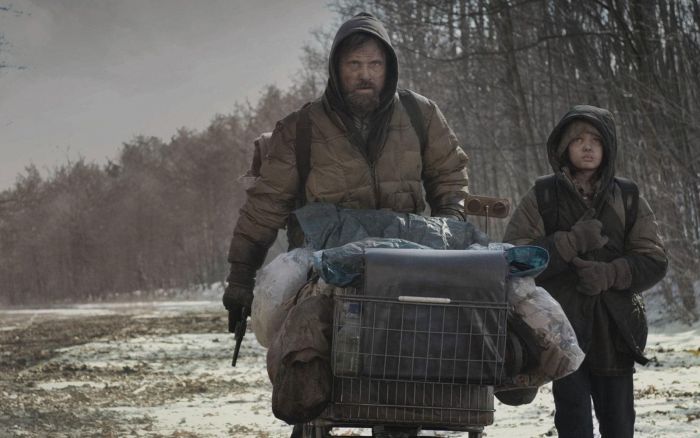Preparing to Travel The Road

I find it hard to think of a film that I’ve been looking forward to more than The Road. I’m keeping my expectations in check (I think), but there’s something so primal and urgent about Cormac McCarthy’s novel that the thought of seeing its images and characters on the silver screen has had me fascinated ever since the movie adaptation was announced.
The Road opens this week and both McCarthy and director John Hillcoat have been giving some fascinating interviews.
WSJ: How does the notion of aging and death affect the work you do? Has it become more urgent?
CM: Your future gets shorter and you recognize that. In recent years, I have had no desire to do anything but work and be with [son] John. I hear people talking about going on a vacation or something and I think, what is that about? I have no desire to go on a trip. My perfect day is sitting in a room with some blank paper. That’s heaven. That’s gold and anything else is just a waste of time.
WSJ: How does that ticking clock affect your work? Does it make you want to write more shorter pieces, or to cap things with a large, all-encompassing work?
CM: I’m not interested in writing short stories. Anything that doesn’t take years of your life and drive you to suicide hardly seems worth doing.
Is it true that some of the only direction McCarthy gave to you was to make sure the film kept as many of the book’s references to God as possible?
Yes, that’s right. Cormac is very intrigued by grace under pressure and a higher spiritual element than man. He’s also interested in the struggle of faith. In many ways The Road is like a biblical tale or a parable. It’s very simple: A man struggling to survive, haunted by all these memories, who then has a son born into this world. They come across all these obstacles that test them. So in that sense it feels almost like a biblical tale, and it certainly has an incredible moral to tell.
That leap of faith that the boy makes at the end is what it’s all about. The boy is the one who saves the man. The man is under pressure, which we completely understand, and under great duress we see his humanity slipping away. It’s actually the boy who saves him. He’s the one with humanity. But where does the boy get this from? He’s born into this God-forsaken place. Where does his “fire” come from? I think it’s great that McCarthy sort of leaves this open to interpretation. It works on so many levels. For a lot of people, this idea of “carrying the fire” is clearly a spiritual thing. But for other people it might just mean “the higher power of humanity.” But it’s definitely also about faith.
Cormac and I did a long interview with the Wall Street Journal recently and it was about all this stuff. Cormac talked about how he was really struck and moved by people like Mother Teresa, who was always struggling with her faith, even at that level. To him that was incredibly profound. For him, The Road is about the struggle of faith, the obstacles on the journey. He created the world of The Road to challenge these people, like the book of Job. It’s about the way that these characters react under duress. Under extreme pressure, the essence of humanity comes out. We can all put ourselves in the shoes of the man — because we see step by step with each challenge how he slides a little bit and loses a bit of his humanity. In the end it’s the boy who gives back the humanity to the man. Cormac sees it as a spiritual lesson — about “carrying the fire,” which is the spirit. He’s basically saying, there is something else here.
Enjoy reading Opus? Want to support my writing? Become a subscriber for just $5/month or $50/year.
Subscribe Today